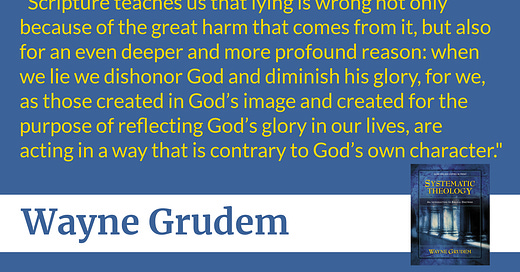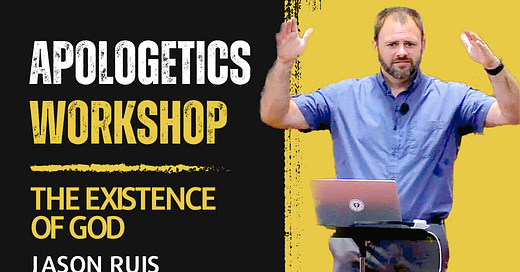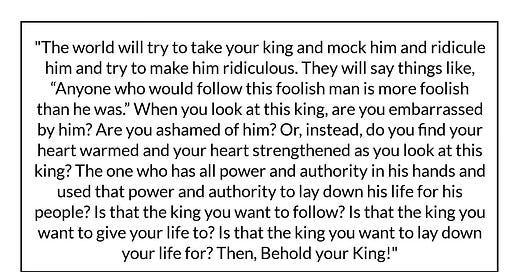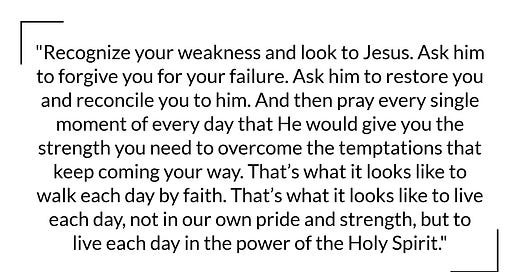
God's Trustworthiness
“And we know that the Son of God has come and has given us understanding, so that we may know him who is true; and we are in him who is true, in his Son Jesus Christ. He is the true God and eternal life.” (1 John 5:20, ESV)
God’s Trustworthiness
There are different ways to describe this attribute of God. Wayne Grudem calls this attribute the “Truthfulness/Faithfulness of God.” Herman Bavinck brings these two words together to form “Trustworthiness.”
Both theologians are trying to relay the meaning of the Hebrew word ʾā·mǎn. This word is translated in various ways throughout the Old Testament. It is translated as “trustworthy,” “faithful,” “truly,” “steady,” “lasting,” “established,” “honest,” and a few more. In the New Testament, they primarily translate this word using “true” or “faithful.” Trying to combine these words into one, I like Bavinck’s word “Trustworthy” because it is the best summary.
God’s Trusworthiness in Scripture
When Moses asked God to show him His glory, God passed before Moses proclaiming “The LORD, the LORD, a God merciful and gracious, slow to anger, and abounding in steadfast love and faithfulness,” (Exodus 34:6, ESV). The Psalmist proclaims, “For your steadfast love is great to the heavens, your faithfulness to the clouds.” (Psalm 57:10, ESV) and “the testimony of the LORD is sure, making wise the simple;” (Psalm 19:7, ESV). When praying to God, King David says, “And now, O Lord GOD, you are God, and your words are true…” (2 Samuel 7:28, ESV).
We see the same things in the New Testament. In 1 Corinthians we read, “God is faithful…” (1 Corinthians 1:9, ESV) and in 1 Thessalonians “He who calls you is faithful; he will surely do it.” (1 Thessalonians 5:24, ESV). Jesus says, “I am the way, and the truth, and the life.” (John 14:6, ESV). And in 1 John we read, “And we know that the Son of God has come and has given us understanding, so that we may know him who is true; and we are in him who is true, in his Son Jesus Christ. He is the true God and eternal life.” (1 John 5:20, ESV).
Three Ways of Understanding Truth
There are three ways to understand truth.
First, we need to understand what John means when he says “He is the true God” (1 John 5:20). This is in contrast to the idols which are “false gods”—lies. False gods are not “truly” God because they are lacking—they fall short of everything God is.
Second, we need to understand King David saying, God’s “words are true” (2 Samuel 7:28) and the passage that says “God is not man, that he should lie, or a son of man, that he should change his mind. Has he said, and will he not do it? Or has he spoken, and will he not fulfill it?” (Numbers 23:19, ESV). God speaks true words, not lies. Also, God is not a hypocrite (which is another form of liar). God IS what he says He is an DOES what he says he will do. He is faithful. He is true.
Finally, we need to understand Jesus’ saying, “I am…the truth” (John 14:6, ESV). This means that Jesus’ words, deeds, and thoughts correspond with reality. They are true. Herman Bavinck says, “God is the truth also in that he knows all things as they really are…in his knowing he is the truth itself…He is the truth in its absolute fullness. He, therefore, is the primary, the original truth, the source of all truth, the truth in all truth” (Reformed Dogmatics, p. 209).
Our Own Trustworthiness
Wayne Grudem is helpful in applying these truths to our own lives. Since this is a communicable attribute, we share this attribute with God.
Grudem says, “We can in part imitate it by striving to have true knowledge about God and about his world…We as God’s children are to imitate our Creator and take great care to be sure that our words are always truthful…Like God, we should love the truth and hate falsehood” (Systematic Theology, p. 196-197).
I would add a couple things to this. We should imitate God by being trustworthy and faithful people—we should do what we say we will do. We should not be hypocrites—we should be who we say we are. We should also seek to live a life that is true—a life lived in line with God’s created world and God’s will.
A Big Deal
These things are a much bigger deal than some would like to make them. Many recognize the damage caused to those around us by lying and living a lie. However, Grudem reminds us that the problem is much deeper. He says, “Scripture teaches us that lying is wrong not only because of the great harm that comes from it, but also for an even deeper and more profound reason: when we lie we dishonor God and diminish his glory, for we, as those created in God’s image and created for the purpose of reflecting God’s glory in our lives, are acting in a way that is contrary to God’s own character.” (Systematic Theology, p. 197).









